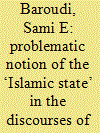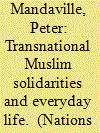|
|
|
Sort Order |
|
|
|
Items / Page
|
|
|
|
|
|
|
| Srl | Item |
| 1 |
ID:
095621


|
|
|
| 2 |
ID:
102823


|
|
|
|
|
| Publication |
2011.
|
| Summary/Abstract |
Today, a new breed of charismatic and media-savvy religious figures are reinvigorating internal debates on Islam by drawing large audiences across the Muslim world and the Muslim diaspora in the West. Using satellite media, websites, blogs and video blogs, these new religious celebrities are changing the nature of debate in Islam from a doctrinaire discourse to a practical discussion that focuses on individual enterprise as a spiritual quest. These leaders have become religious entrepreneurs, with sophisticated networks of message distribution and media presence. From Amr Khaled and Moez Masood, two leading figures of Arab Islamic entertainment television, to Baba Ali, a famous Muslim video blogger from California, Islam has never been more marketable. Satellite television and the internet are becoming fertile discursive spaces where not only religious meanings are reconfigured but also new Islamic experiences are mediated transnationally. This delocalisation of Islamic authority beyond the traditional sources of Egypt and Saudi Arabia is generating new producers and locales of religious meaning in Dubai, London, Paris and Los Angeles. This article examines the impact of celebrity religious figures and their new media technologies on the relativisation of authority in Islam and the emergence of a cosmopolitan transnational audience of Muslims. I ask if this transnational and seemingly apolitical effort is generating a new form of religious nationalism that devalues the importance of national loyalties.
|
|
|
|
|
|
|
|
|
|
|
|
|
|
|
|
| 3 |
ID:
174167


|
|
|
|
|
| Summary/Abstract |
This article examines the conceptualization of the 'Islamic state' by one reputable Arab Islamist scholar, Muhammad Abu Zahra. It contends that he fails to provide internally consistent answers to four key questions. First, does the Islamic state presently exist, or is it yet to be established; and if the latter is the case then by whom and how? Second, was the historic caliphate which allegedly extended from the death of the Prophet until the Ottoman caliphate’s dissolution an 'Islamic state'? Third, is the 'Islamic state' universal in scope, or can there be several Islamic states at the same time? Fourth, what is the relationship between the 'Islamic state' and Islamic unity; and can the latter be achieved outside the context of the 'Islamic state'? I argue that Abu Zahra’s conceptualization of the 'Islamic state' is heavily influenced by 'modern'/European ideas about the nation-state; as a sovereign entity with the authority to impose its writ over its citizens and territory. I conclude that the 'Islamic state' is a stillborn idea being a hybrid of two highly incompatible sets of genes: the Islamic tradition, which does not conceive the Umma in territorial terms, and the 'modern'/ European notion of the territorial state.
|
|
|
|
|
|
|
|
|
|
|
|
|
|
|
|
| 4 |
ID:
085576


|
|
|
|
|
| Publication |
2008.
|
| Summary/Abstract |
This article explores the possibilities of the emergence of a genuinely "post-Western," and less Eurocentric, "critical" international relations (IR) theory through a brief examination of "critical" discourses within two "non-western" cosmopolitan traditions: Islam and Sikhism. It is argued that, although critical IR has created space for the articulation of post-western discourses within the discipline, it continues to speak for and to the West. A genuinely "post-western" critical IR would seek to go beyond mere mimicry of the "derivative discourses" of the modern West by identifying critical discourses on the political from within non-western traditions.
|
|
|
|
|
|
|
|
|
|
|
|
|
|
|
|
| 5 |
ID:
102822


|
|
|
|
|
| Publication |
2011.
|
| Summary/Abstract |
Discussions of globalisation and identity have focused on the renewed relevance of various post-national frameworks of belonging, including the Muslim umma. This article argues against the idea that the umma has come to constitute a primary referent in contemporary Muslim debates about identity or a form of globalised political consciousness. Furthermore, the advent of 'post-Islamism' means that Islamic political mobilisation rarely seeks to establish alternative political orders within the container of the nation-state. However, this does not mean that we are seeing a reaffirmation of the nation in Muslim contexts today. Rather, transnational Muslim solidarities represent an intermediate space of affiliation and socio-political mobilisation that exists alongside and in an ambivalent relationship with the nation-state. I point to two different socio-religious movements that, without positing the primacy or exclusivity of the umma/Islamic identity, express discrepant visions of the relationship between Islam and the nation: (1) the Fethullah Gülen movement, which serves simultaneously as the vehicle for a particular vision of neo-Ottoman Turkish nationalism and a critique of the Kemalist national order; and (2) the neo-Salafist movement, read here as an effort to embed conceptions of public morality and accountability within the discursive tradition of orthodox Islam rather than the institutional framework of modern polity.
|
|
|
|
|
|
|
|
|
|
|
|
|
|
|
|
|
|
|
|
|